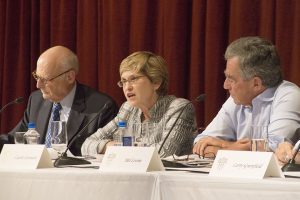Scholars consider impact of Jewish vote on election
USC’s Casden Institute, which centers its research on the role of Jewish voters in America, held a panel, titled “Decision 2016: Jews and the Presidential Election,” to discuss the election as it relates to Jewish voters in Town and Gown on Sunday.

Julia Erickson | Daily Trojan
Minority majority · Zev Yaroslavsky (left), Laurie Levenson (center) and Mel Levine (right) spoke on Jewish support for other minority groups Monday.
The event was the 2016 installment of the Lee Lecture Series, a lecture series that brings together scholars from varied fields to talk to the L.A. community.
The panel featured six members of the Jewish communities and experts in their respective fields: Steven Windmueller, professor emeritus at Hebrew-Union College; Larry Greenfield; investment banker and former executive director of the Republican Jewish Coalition; Mel Levine, former U.S. representative, 27th Congressional District; Laurie Levenson, professor of law and director for center of legal advocacy at Loyola Law School; Dan Schnur, director of the Jesse M. Unruh Institute of Politics at USC; and Zev Yaroslavsky, former member of the L.A. County Board of Supervisors from District 3.
The event consisted of a one-hour discussion by the panelists about topics related to the presidential candidates and Jewish-American voters, followed by a 30-minute question and answer session.
The panelists spoke about their views and thoughts on the presidential election in regards to the Jewish population. As Greenfield noted, there are many analogies between United States history and Jewish history.
“The ancient kingdom of Israel essentially modeled the balance between empire and anarchy,” Greenfield said. “Our Western Judeo-Christian political tradition is built on this moderate middle path: limited self-government of, by and for the people, respect for the equality of all human beings, and the eternal struggle for freedom within the boundaries of law.”
Several of the panelists — including Levenson and Schnur — noted that as a minority group that has often been treated more harshly in the past as a result, it is only natural to be sympathetic toward the other targeted minority groups in the 2016 election.
“We are the other, we always have been,” Schnur said. “We have an obligation to dispel that fear and face the hatred … and reach out to support more vulnerable ‘others.’”
That sentiment was echoed by Yaroslavsky, who believes that Jews see some of their own history as a minority in some of the rhetoric by today’s candidates.
“Once you unleash the forces of prejudice against one group, no group is safe,” Yaroslavsky said. “When you’re a minority, it’s a matter of not just civic duty, but survival — you have to be involved in democracy, in government, in electing people.”
This panel was not without its disagreements, both ideologically and on the subject of who should be the next president. The few things they could all agree on were Trump’s failings and that the Dodgers win was reason to celebrate. Although there was only one Republican on the panel, Greenfield, there was much more diversity of opinion among the audience, which was reflected in the questions that were asked, which ranged from doubts about Clinton’s honesty to reservations about Trump’s immigration policy.
As polarizing as the election and political discussion is, for Windmueller, the election as it pertains to the Jewish community is an important discussion to have due to the historically lower mobilization of Jewish voters in this election cycle.
“We’re seeing in the Jewish community for the first time, somewhere between 8 and 10 percent of American Jews are not prepared to vote in this election,” Windmueller said. “Jews tend to be highly motivated and politically involved, but this election we see something different, which is why I think it’s important that these conversations take place.”
